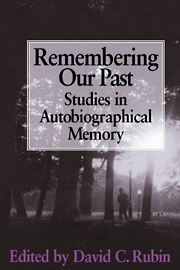Book contents
- Frontmatter
- Contents
- List of contributors
- 1 Introduction
- Part I Approaches
- Part II Accuracy
- Part III Emotions
- 8 Perspective, meaning, and remembering
- 9 Emotional events and emotions in autobiographical memories
- 10 Depression and the specificity of autobiographical memory
- Part IV Social functions
- Part V Development and disruption
- Subject index
- Author index
10 - Depression and the specificity of autobiographical memory
Published online by Cambridge University Press: 14 October 2009
- Frontmatter
- Contents
- List of contributors
- 1 Introduction
- Part I Approaches
- Part II Accuracy
- Part III Emotions
- 8 Perspective, meaning, and remembering
- 9 Emotional events and emotions in autobiographical memories
- 10 Depression and the specificity of autobiographical memory
- Part IV Social functions
- Part V Development and disruption
- Subject index
- Author index
Summary
There are many ways to become depressed, and many ways in which recovery from depression is impaired. This chapter outlines how a person's memory can play a role in both. Past research has shown how depression affects and is affected by the type of events a person remembers. Negative mood promotes the recall of unpleasant events, either by making their activation more easy, or by impeding retrieval of alternative, more positive events. But I am not concerned here with the connection between depression and the preferential access to negative episodic memory, important though it is. This has been reviewed before many times (see Blaney, 1986; Christianson & Safer, this volume; Teasdale & Barnard, 1993; Williams, Watts, Macleod, & Mathews, 1988). Most of the research investigating mood congruent memory uses word or story learning paradigms rather than autobiographical memory. When autobiographical memory is the subject of study, the questions asked of it naturally focus on the reasons why some memories are faster or more probable to retrieve than others. The predominant paradigm within which explanations are sought is associative network theory, a framework that has been increasingly found not to account for the complexity of the data (Teasdale & Barnard, 1993; Williams et al., 1988). Instead, in this chapter I am concerned with exploring the connection between depression and the quality of the memory that is retrieved, a topic of inquiry for which network theory was not designed. In particular, I am interested in whether a person retrieves a specific event or a summary of events.
First, I shall review evidence suggesting that depressed people use an overgeneral mode of retrieval, itself a clinically important phenomenon.
Information
- Type
- Chapter
- Information
- Remembering our PastStudies in Autobiographical Memory, pp. 244 - 268Publisher: Cambridge University PressPrint publication year: 1996
Accessibility standard: Unknown
Why this information is here
This section outlines the accessibility features of this content - including support for screen readers, full keyboard navigation and high-contrast display options. This may not be relevant for you.Accessibility Information
- 254
- Cited by
